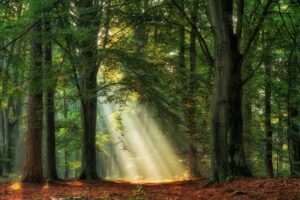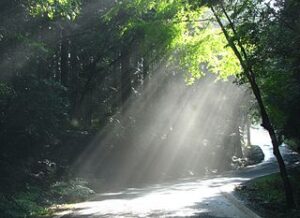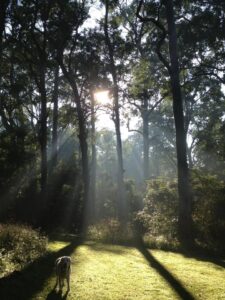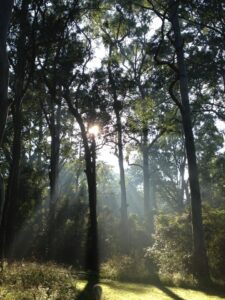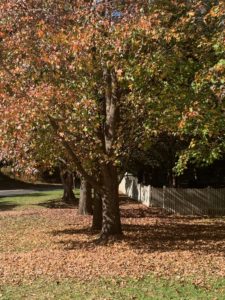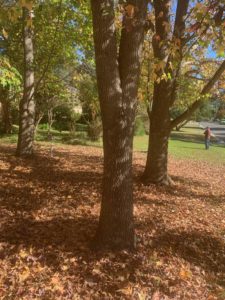When I took these photos in the Edna Hunt Sanctuary in Eastwood Sydney NSW while on an early morning walk with Millie (yes I am pleased Millie is there standing with me mesmerised. This was an epiphanic moment for me at the time in 2012 . I actually stood in it and it was like the ephemeral thing of grace falling all around me. I had to go back and retrieve these photos to share here on my blog as I had a new experience this morning The story is below .
Komorebi (木漏れ日): Sunshine filtering through the trees
The cello’s dappled flow, with the guitars sharp strings of light-fall, in the new music by Alisha Redmond played on the ABC this morning caught my attention for further study. It was titled Komorebi. I googled the word only to find it is a Japanese word coined to describe that light that shimmers through leaves and plays its music too on the footfall of your bush track swaying rhythm to the whim of wind at the time.
There isn’t really an English word equivalent: we speak of dappled, filtered, light. Spiritually we can speak of our connection with nature, symbolising a harmony that can inspire feeling of awes, tranquility, and sublime beauty. The sight of Komorebi – the dappled sunlight, the shifting shadows, and the leaves aglow with the radiant light – is something that resonates deeply with me. Once walking with Millie in the Sanctuary I used to live near the experience of komorebi was like an epiphany for me at a certain time in my life.
I googled the word Komorebi to find it defined as
Komorebi 木漏れ日 (pronounced kō-mō-leh-bē) Literally, “sunlight leaking through trees” this word describes the beauty and wonder of rays of light dappling through overhead leaves, casting dancing shadows on the forest floor.
Another definition states, Japanese term “Komorebi”, for which no simple English translation exists. Yet it is a distinct phenomenon, that anyone who spends time among trees will have enjoyed. roughly translates as “the scattered light that filters through when sunlight shines through trees”. It is made up of three “Kanji” or Chinese characters: “tree” or “trees”, “leaking-through” or “escape”, and “light” or “sun”.
Thank goodness for google for then I met an Arboriculturist on a site called AWA and he becomes poetic doing the research I was going to do as he writes:
Komorebi is especially noticeable when the sun is low, and mist or smoke can add to the effect. The impact of Komorebi to the observer can range from creating a pleasant ambiance for a walk through the woods, to generating feelings of awe – which in the right place at the right time – verges on the transcendental. As an arboricultural consultant, I spend more time than most looking at trees when undertaking tree surveys for planning, and occasional experiences of Komorebi have caught me unaware, and have momentarily transformed the most uninspiring trees in development sites, into something special.
Less technical and more poetical attempts have been made in the English language to capture the event. Without a suitable term, several poets and authors felt compelled to invent their own words:
Dylan Thomas called it “windfall light”, in his poem “Fern Hill”, writing:
And once below a time I lordly had the trees and leaves
Trail with daisies and barley
Down the rivers of the windfall light.
The poet Gerard Manley Hopkins created the term “shivelight” for: “the lances of sunshine that pierce the canopy of a wood”’.
The author C.S. Lewis was a fan of these “shafts of delicious sunlight” or “Godlight”, writing: “Any patch of sunlight in a wood will show you something about the sun which you could never get from reading books on astronomy. These pure and spontaneous pleasures are patches of Godlight in the woods of our experience.”
Despite their efforts, none of these words have caught on.
Komorebi, like several similar terms, highlights the influence of nature and aesthetics that is unique to Japanese culture.
Perhaps, beyond poets and physicists, there is no need for an English equivalent. The experience – of observing sunlight through trees – might be enough. Indeed, the absence of a comparable word allows respite from the taxonomic rumination that occurs in most other aspects of life, helping Komorebi remain as one of life’s “pure and spontaneous pleasures”. https://colleenkeatingpoet.com/5925-2/
Adam Winson (Chartered Arboriculturist,) Photos: Lars van de Goor
